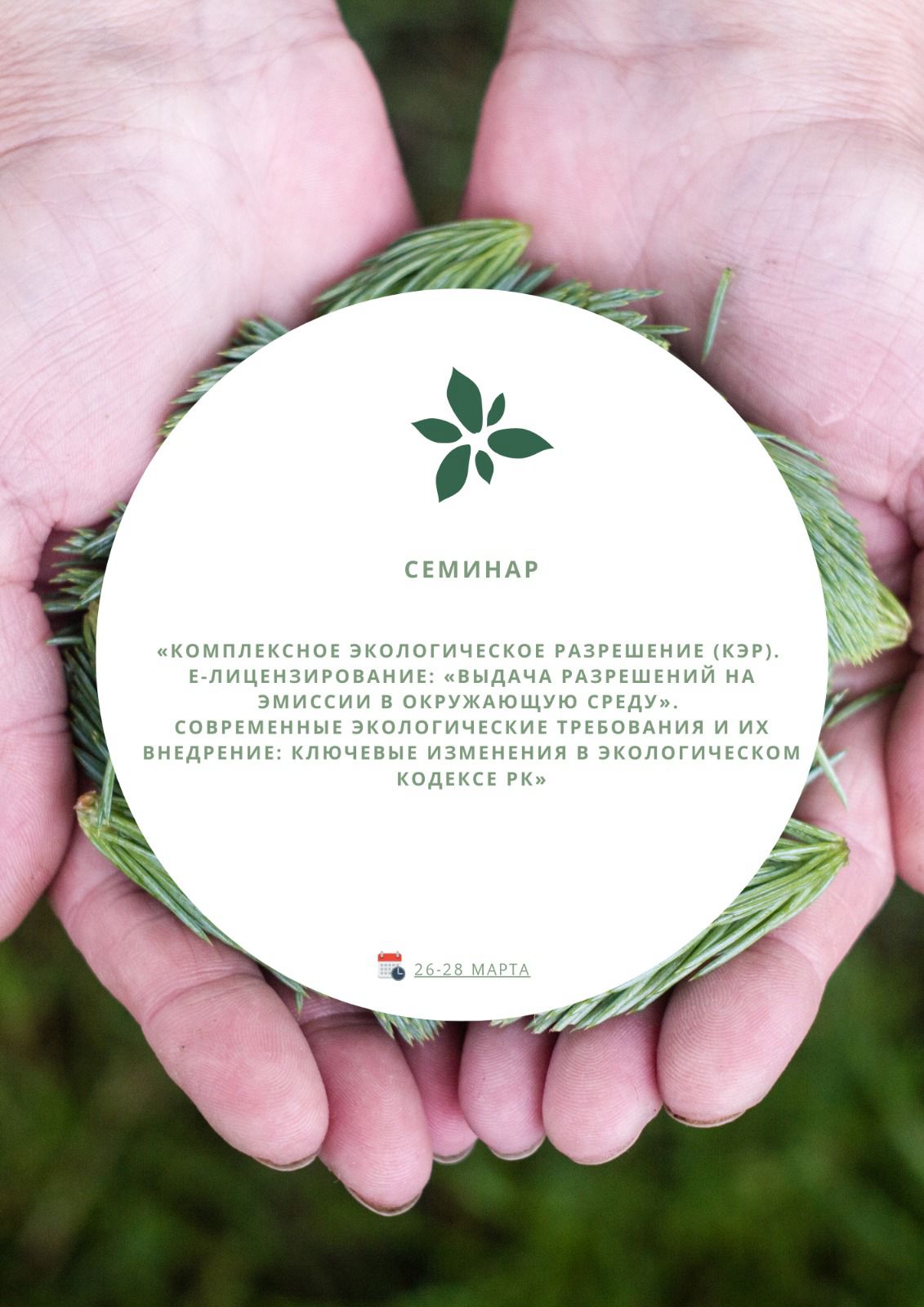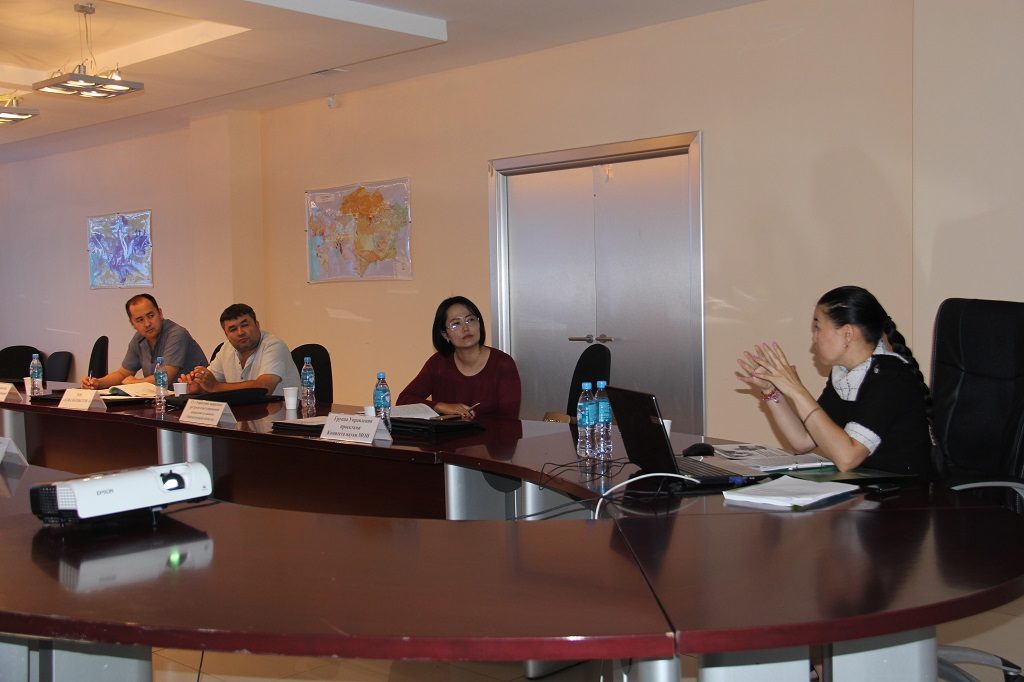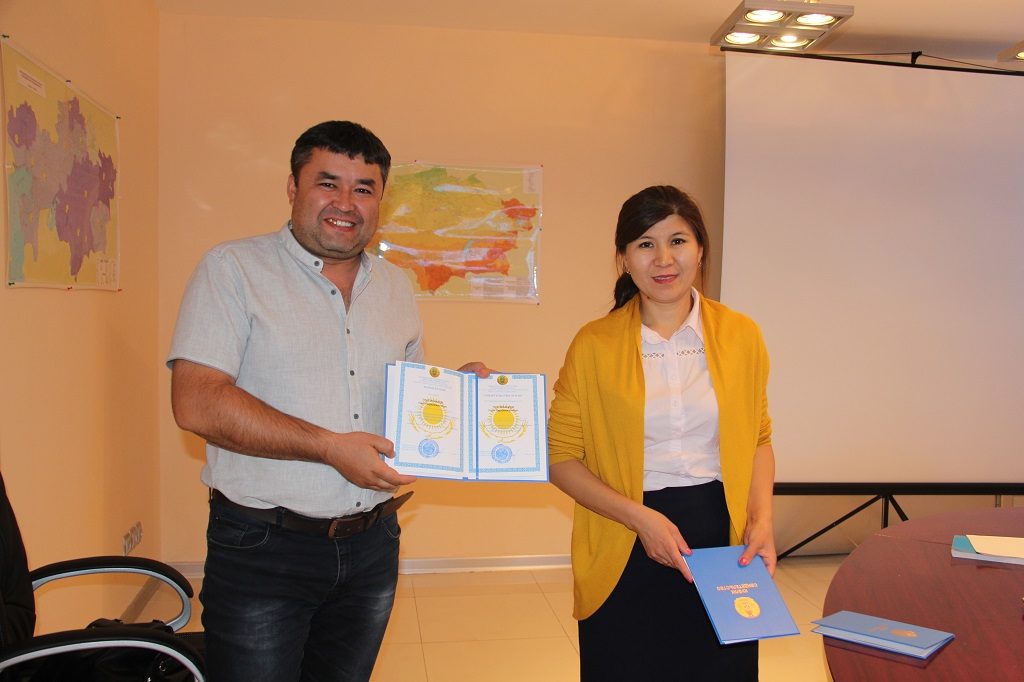Приглашаем на обучающий семинар!
🔍 Тема:
«Комплексное экологическое разрешение (КЭР). Е-лицензирование: «Выдача разрешений на эмиссии в окружающую среду». Современнные экологические требования и их внедрение: ключевые изменения в Экологическом кодексе РК»».

📅 Дата: 26-28 марта 2025 г.
⏰ Формат: Онлайн
📍 Организатор: РГП на ПХВ «Информационно-аналитический центр охраны окружающей среды» Министерства экологии и природных ресурсов РК
📍 Регистрация: https://forms.gle/gDtmSV3gRPStrt7y9
🔹 Что вас ждёт?
На семинаре будут рассмотрены актуальные вопросы экологического законодательства и природоохранной деятельности:
• Последние изменения в Экологическом кодексе РК;
• Производственный экологический контроль: новые требования и практика применения;
• Автоматизированная система мониторинга эмиссий: как работает и что учитывать;
• Современные методы управления отходами;
• Комплексное экологическое разрешение (КЭР): этапы получения и ключевые требования;
• Е-лицензирование: порядок выдачи разрешений на эмиссии в окружающую среду.
👩🏫 Лекторы — Лекции проводят эксперты Министерства экологии и природных ресурсов РК, что даёт возможность получить актуальную и достоверную информацию напрямую от специалистов, задать интересующие вопросы и обсудить практические кейсы.
 Loading…
Loading…
 Loading…
Loading…
Registration
Н.Нигматулин: новый Кодекс позволит эффективнее решать вопросы защиты экологии
Источник – www.parlam.kz
Нур-Султан, 12 октября, Дом Мажилиса. Председатель Мажилиса Нурлан Нигматулин считает, что новый Экологический кодекс должен способствовать, прежде всего, повышению качества жизни казахстанцев. Своим мнением Спикер Палаты поделился во время обсуждения, которое состоялось сегодня в Мажилисе. В обсуждении наиболее актуальных вопросов нового Экологического кодекса, который сейчас находится в работе депутатов Мажилиса, приняли участие руководители государственных органов, НПП «Атамекен», крупных отечественных предприятий, экологи-эксперты, а также представители гражданского общества.
Спикер Мажилиса Нурлан Нигматулин акцентировал внимание на поручениях руководства страны проработать комплекс мер для улучшения экологической обстановки в Казахстане, одной из которых выступает актуализация экологического законодательства.
В ходе обсуждения особое внимание уделено такой норме проекта нового Экологического кодекса, как переход на комплексные экологические разрешения для объектов Iкатегории с условием внедрения наилучших доступных технологий (НДТ). По мнению разработчиков, модернизация технологических процессов позволит снизить эмиссии в окружающую среду. В качестве стимулирующих для предприятий мер предлагается освободить предприятия от экологических платежей в случае внедрения НДТ, в обратном же случае – постепенно повышать платы за эмиссии. Согласившись с необходимостью такой нормы, депутаты Мажилиса вместе с тем подняли вопрос относительно предприятий, которые по объективным причинам не смогут за 10 лет, которые отводятся для внедрения НДТ, достичь установленных нормативов по отдельным показателям. А при неисполнении обязательств по внедрению НДТ предусматриваются штрафные санкции в виде невыплаченных экологических платежей за все годы с повышающими коэффициентами и пенёй. По словам Спикера Мажилиса, в таких случаях важно не «загнать» эти предприятия в тупик, когда они начнут платить огромные деньги в виде штрафов за эти 10 лет. – Надо понимать, что это всегда уменьшение объемов производства, это всегда сокращение рабочих мест. В общем, здесь есть большая социальная составляющая, – сказал Спикер Мажилиса. Вместе с тем, отметив, что внедрение НДТ – это вопрос не одного дня, Нурлан Нигматулин подчеркнул, что нормы по стимулированию внедрения НДТ должны способствовать технологическому перевооружению предприятий. И все это направлено на достижение стандартов ОЭСР.
Депутаты Мажилиса также подняли вопрос относительно предлагаемой нормы, согласно которой вводится запрет на производство и эксплуатацию в нашей стране транспортных средств, не соответствующих требованиям Технического регламента ЕврАзЭс. Обеспокоенность мажилисменов вызывает тот факт, что от этого могут пострадать сельские жители, многие из которых до сих пор пользуются старой сельхозтехникой. Согласно статистике, в стране 82% тракторов и 65% комбайнов со сроком эксплуатации свыше 15 лет. И только 30% всего парка сельхозтехники соответствует современным требованиям. По мнению Спикера Мажилиса, эту норму необходимо тщательно проработать, чтобы не создать ситуацию, когда сельчанам будет не на чем работать.
Депутаты подняли вопрос и относительно экологического страхования. Предусматривается, что это будет обязательным только для объектов Iкатегории. Вместе с тем, в стране свыше 2 тыс. объектов IIкатегории и более 3 тыс. объектов III категории, которые попадают под категорию экологически опасных видов хозяйственной и иной деятельности. По мнению Нурлана Нигматулина, эти объекты тоже следует охватить экологическим страхованием. Подводя итоги обсуждения, Председатель Мажилиса подчеркнул, что главная цель депутатского корпуса – принять такой документ, который позволит эффективно решать вопросы защиты окружающей среды, улучшения качества жизни казахстанцев и динамичного развития экономики с учётом реалий сегодняшнего дня. – Сегодняшнее обсуждение проекта Экологического кодекса в таком широком формате показало, что изначальная дискуссионность по многим актуальным вопросам уже снята. И важно то, что, прорабатывая каждую новую норму, все руководствовались принципом не навредить: ни экологии, ни обществу, ни экономике, – резюмировал Нурлан Нигматулин.
(KZ) Табиғат пайдаланушы қоршаған ортаны бастапқы қалпына келтіруге міндеттеледі – министр
Источник: inform.kz
НУР-СУЛТАН. КАЗИНФОРМ – В случае возникновения экологического ущерба природопользователей в Казахстане обяжут восстановить окружающую среду до первоначального уровня. Об этом заявил министр экологии, геологии и природных ресурсов РК Магзум Мирзагалиев в ходе презентации проекта нового Экологического кодекса в Мажилисе.
«Существующий экономический механизм природопользования (система платежей и их планирование) не стимулирует природопользователей на снижение уровня загрязнения окружающей среды. В связи с этим, в проекте Кодекса был предложен принцип «загрязнитель платит», который впервые был сформулирован экспертами ОЭСР в 1972 году», – сказал Магзум Мирзагалиев.
Данный принцип, как отметил министр, подразумевает меры по предотвращению загрязнения и контролю, а также ответственность за восстановление от ущерба окружающей среде.
«Таким образом, будут созданы такие условия, при которых природопользователям будет выгоднее принять все меры по недопущению негативного воздействия на окружающую среду, чем платить экологические штрафы. В случае возникновения экологического ущерба природопользователь обязан восстановить окружающую среду до первоначального уровня», – заключил глава Минэкологии.
Пенсионер из Жамбылской области возрождает кролиководство
Источник: www.24.kz

В Жамбылской области пенсионер Шакен Жапаралиев возрождает кролиководство. Такая отрасль животноводства для жителей села Кумарык Турар Рыскуловского района стала в диковинку.
Сейчас мужчина содержит 200 кроликов породы «фландр» и «великан». В этом году он планирует довести их количество до тысячи.
По словам аксакала, кроличье мясо пользуется большим спросом. Недавно пенсионер заключил договор с ресторанами Астаны и Алматы на поставку мяса. В будущем Шакен Жапаралиев намерен увеличить число кроликов до 5 тысяч особей.
Шакен Жапаралиев, житель села Кумарык:
– В октябре или ноябре планирую поехать в Китай. Там хочу освоить технологию обработки кроличьих шкур и закупить всё необходимое.
Пресс-релиз о проведенном семинаре с 15-17 августа на тему «Экологическое нормирование и проектирование в сфере природопользования и охраны окружающей среды»
РГП на ПХВ «Информационно-аналитический центр охраны окружающей среды» МЭ РК в период с 15 по 17 августа 2018 года в г.Астана был проведен обучающий семинар для специалистов в области охраны окружающей среды и природопользования на тему «Экологическое нормирование и проектирование в сфере природопользования и охраны окружающей среды»
Участниками семинара были представители: АО «Алматинские электрические станции»; ТОО «Проектный институт «OPTIMUM»; ТОО «Асфальтобетон 1»; ТОО «СП «КазГерМунай»; Группа Управления проектами Комитета науки МОН РК ; ГУ «Управление природных ресурсов и регулирования природопользования Мангистауской области»; ИП «Чабан В.В.»; Учреждение НПО «Экосфера»».
На семинаре рассматривались следующие вопросы:
- Разрешения на эмиссии в окружающую среду;
- Экологическое регулирование;
- Внедрение Регистра выбросов и переноса загрязнителей в Казахстане;
- Хозяйствующая деятельность в сфере отходов ;
- Ведение Государственного кадастра отходов производства и потребления;
- Предоставление экологической информации;
- Особенности проведения ОВОС. Наличие ПЭК, ПУО, ППМ в проектах; Стратегическая экологическая оценка;
- Проводимая работа по обращению с твердыми бытовыми отходами;
- Порядок получения лицензии на осуществление работ по природоохранному нормированию и проектированию.
Лекции читали:
Каратаева Динара Ахметовна – Главный эксперт КЭРК МЭ РК
Досмакова Бизара Жакиевна – И.о.директора Департамента управления отходами МЭ РК;
Садвокасова Алия Малаевна – Руководитель управления ДГФЭИ РГП на ПХВ «ИАЦ ООС» МЭ РК;
Балабаева Алтын Ибрагимовна – Директор Департамента ГФЭИ РГП на ПХВ «ИАЦ ООС» МЭ РК
Ингербаева Жанат Умбетовна – Главный эксперт КЭРК МЭ РК;
Абдрахманова Жанара Беркутовна – Главный эксперт МЭ РК;
Букенова Саида Бекбулатовна – Руководитель управления кадастра отходов Департамента информационных технологий РГП на ПХВ «ИАЦ ООС» МЭ РК;
Кондратенко Михаил Геннадьевич –Директор Департамента информационных технологий РГП на ПХВ «ИАЦ ООС» МЭ РК.
По окончании семинара слушателям вручены свидетельства.


Issues on implementation the register of emissions and transfer of pollutants in Kazakhstan
Issues on implementation the register of emissions and transfer of pollutants in Kazakhstan, assessment methods of mercury and resistant organic emissions have discussed in Astana within a seminar “Pollutants and mercury emissions to the environment: definition methods, inventory and adding in State register of emissions and transfer of pollutants of the Republic of Kazakhstan”. The seminar has taken place on April 11, 2018 in Astana in «Grand Park Esil» hotel.
Seminar was organized by Information and analysis center of environmental protection, Program of development of the UN in Kazakhstan and Center “Assistance to Sustainable Development” with assistance of the Ministry of Energy of the Republic of Kazakhstan.
Since 2017 industrial enterprises of category I have to provide reports on pollutants emissions for adding in the register of emissions and transfer of pollutants (PRTR) available to wide public. The list of substances which are subject to the report includes 86 substances including resistant organic pollutants, mercury and other dangerous chemicals.
The seminar was held for increasing of interested parties capacity regarding the Pollutants report, PRTR implementation in Kazakhstan and also pilot testing of portal for online emissions reporting.
60 people have participated in the seminar including representatives of the Ministry of Energy of the Republic of Kazakhstan, Administration of natural resources and regulation of natural recourse users, Department of ecology, Department of public health, mining, power, oil processing, metallurgical, chemical enterprises and SPA from Astana, Akmola, Karaganda, East Kazakhstan, Kostanay and Almaty regions.
Within session on State register of emissions and transfer of pollutants maintaining in Kazakhstan it was considered requirements of the Republic of Kazakhstan legislation for maintaining of State register of emissions and transfer of pollutants in the Republic of Kazakhstan, also the current situation on ratification of PRTR Protocol in Kazakhstan. National manuals projects by assessment methods of emissions for key and priority sectors have been submitted to participants.
During software session for providing the report in State PRTR, participants work with portal developed by RSE on PVC “Information analitycal center” which makes automatic process of PRTR maintaining. Architecture of created portal assumes three basic elements: application server as the main kernel, database server as the main data storage, private office as an instrument of users interaction with PRTR portal. Participants have taken part in portal testing, could enter data in a pilot mode and also have developed a number of recommendations about system improvement of online reporting.
During emission assessment sessions of mercury and other heavy metals to the environment and emissions assessment of resistant organic pollutants to the environment, participants have considered international techniques of emissions assessment developed by UNEP and EMEP.
Suggestion and recommendations which were announced within the seminar will be considered during PRTR implementation in Kazakhstan and improvement of methodical providing in the field of emissions assessment.







International experience and current Kazakhstan practice of implementing the pollutant release and transfer register

The seminar “International experience and current Kazakhstan practice of implementing the pollutant release and transfer register” was held on November 2, 2017 in Pavlodar.
The organizer was the Center “Cooperation for Sustainable Development”. The seminar was held within the framework of the joint project of the “Information and Analytical Center for Environmental Protection” RSE and the UNITAR “Global PRTR Implementation Project as a Tool for Reporting POPs, Dissemination and Raising Awareness for Kazakhstan”.
At the seminar 45 people have participated. Including representatives of the Department of Public Health Protection, the Department of Ecology, the Department of Statistics, the Department of Natural Resources and Environmental Management and other government agencies in the Pavlodar region, as well as mining, energy, oil refining, metallurgical and chemical industries, environmental design organizations and laboratories, Aarhus Center of Pavlodar and non-governmental organizations.
The main task of the seminar was to increase the potential capacity of specialists on the PRTR issue and formulate proposals for the development of methodological support for the introduction of PRTR in Kazakhstan.
Main provisions of the PRTR Protocol and international experience of its implementation, review of the PRTR introduction in Kazakhstan, current situation in the assessment of emissions and transfer of pollutants into the air, sewage, soil (from production and consumption wastes) were considered at the seminar.
The seminar participants took an active part in the discussion of the lists of pollutants for reporting on emissions into air, water and soil.
The seminar provided an opportunity to increase the potential capacity of specialists on the PRTR issue, to share experience and to formulate the most acceptable proposals for the development of methodological support for PRTR implementation in Kazakhstan.




«INTERNATIONAL EXPERIENCE AND CURRENT KAZAKHSTAN PRACTICE OF IMPLEMENTATION OF THE PRTR»
«INTERNATIONAL EXPERIENCE AND CURRENT KAZAKHSTAN PRACTICE OF implementation OF THE prtr»
Topical issues of introduction of the pollutant release and transfer register (PRTR) in Kazakhstan were discussed in Astana. The seminar “International experience and current Kazakhstan practice of implementing the pollutant release and transfer register” was held on October 30, 2017.
At present, works on ratifying the PRTR Protocol to the Convention on Access to Information, Public Participation in Decision-making and Access to Justice in Environmental Matters is carried out in Kazakhstan. The Environmental Code has been amended to introduce a State PRTR (Article 160).
The seminar was held within the framework of the Project “Information and Analytical Center for Environmental Protection” RSE and UNITAR “Global PRTR Implementation Project as a Tool for POPs Reporting, Dissemination and Raising Awareness for Kazakhstan” and with the support of the OSCE Program Office in Astana. The organizer was the Center “Cooperation for Sustainable Development”.
More than 70 people took part in the seminar. Among the participants of the seminar were representatives of state bodies: the Department of Environmental Monitoring and Information, the Department of Waste Management, the Department for Climate Change, the Committee for Environmental Regulation and Control of the Ministry of Energy of the Republic of Kazakhstan, the Department of Ecology of the Karaganda Region, the Committee on Statistics of the Ministry of National Economy of the Republic of Kazakhstan, IAC EP RSE on CEC of the Ministry of Energy of the RK, “Kazhydromet” RSE, “Zhasyl Damu” JSC. Industrial enterprises took an active part in the seminar: Samruk-Energo JSC, NC KazMunayGas JSC, JSC ArcelorMittal Temirtau JSC, KPO B.V., ATYRAU REFINERY LLP and other enterprises of mining, energy, oil refining, metallurgy, and chemical industries. The non-governmental sector was represented by regional Aarhus Centers and other NGOs.
The main goal of the seminar was to increase the potential capacity of specialists on the PRTR issue and formulate proposals for developing methodological support for PRTR implementation in Kazakhstan.
Participants are presented with the main provisions of the PRTR Protocol, an overview of the implementation of the PRTR in Kazakhstan, the National Proposals of the Republic of Kazakhstan on PRTRs, and the current requirements of the legislation of the Republic of Kazakhstan on providing information for public PRTRs.
The seminar was attended by the international expert – the head of the “Citizens Support Center”, the coordinator of the projects of the NGO Arnika (Czech Republic) Martin Skalsky. He answered to the questions of state bodies, industrial enterprises and NGOs on international experience and best practices for implementing the PRTR Protocol.
The listeners considered the current situation on the estimation of emissions and transfer of pollutants into the air, sewage, soil (from production and consumption wastes). During the discussion, the participants analyzed the list of pollutants for PRTR reporting.
Within the framework of the discussions the participants spoke on the main important aspects of PRTR implementation in Kazakhstan. Industrial enterprises are concerned about the introduction of additional forms of PRTR reporting, nongovernmental organizations – the availability of PRTR data and the possibility of their use.
All proposals made during the seminar will be reflected in the Workshop Protocol and will be used in the future when implementing the Project and implementing PRTRs in Kazakhstan.
Download report “История создания и основные положения Протокола РВПЗ” (Анисимова)
Press release following the results of EXPO-2017
Published: www:en.energo.gov.kz
On September 22, 2017 in the press center of the Office of the Prime Minister of RK a press conference on the results of the International specialized exhibition EXPO-2017 with the participation of the Deputy Minister of Energy of the RK Magzum Mirzagaliev was held.
The Ministry of Energy of the RK has selected 28 indigenous developments for the national pavilion Nur-Alem in such areas as renewable energy sources (such scientists as Albert Bolotov, Marat Koshumbayev, Nikolay Buktukov), in the sphere of waste management (such scientists as Alexander Ustimenko, Sergei Trebukhov), energy efficiency (such scientists as Amangeldy Taukenov, Askar Aryngazin, Dias Bayseitov) and others.
To implement the leading foreign technologies presented at EXPO, the Ministry of Energy of the Republic of Kazakhstan created an expert working group of more than 40 leading experts of national companies such as KazMunayGas, Kaztransgaz, KEGOC and others, as well as analytical experts in various energy sectors, representatives of the Ministry and subordinate structures.
The expert working group has made a list of 105 technologies from countries such as Austria, Germany, the Netherlands, Russia, Finland and others. According to their specifics, these technologies are divided into four areas:
– oil and gas – 27 technologies,
– coal and nuclear industry – 5 technologies,
– electricity, energy saving and RES – 44 technologies,
– ecology, including waste management, water treatment, air quality control – 29 technologies.
At the moment out of 105 technologies, 42 are in detailed development in 9 local companies, 2 universities are working with 14 of them and 2 akimats already works with 12 projects.
The list of technologies with the necessary information is posted on the Ministry’s website (link to the projects: http://energo.gov.kz/index.php?id=7), and was sent to local executive bodies and 170 companies.
Press service of the Ministry of Energy of the Republic of Kazakhstan



